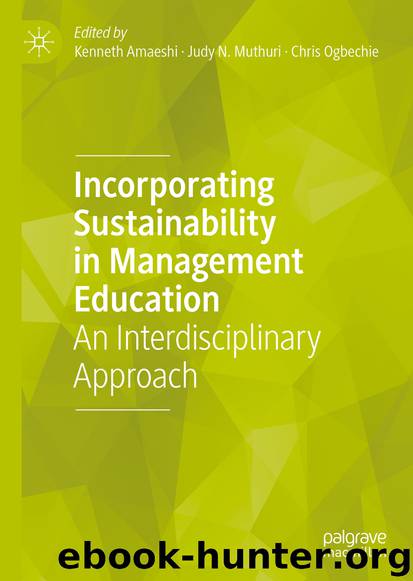Incorporating Sustainability in Management Education by Kenneth Amaeshi & Judy N. Muthuri & Chris Ogbechie

Author:Kenneth Amaeshi & Judy N. Muthuri & Chris Ogbechie
Language: eng
Format: epub
ISBN: 9783319981253
Publisher: Springer International Publishing
Setting the Context: Making the Case for Sustainability
Although the natural environment is pervasive in public discourse and there are opportunities for environmental education across the National Curriculum for primary and secondary state schools in England (National Association for Environmental Education 2018), we often find that students come to the classroom with little understanding of sustainability. Thus, to begin a discussion about the relationship between the business (and marketing) field and the planet, it is important to clarify to students the concept of sustainability and the interlinked nature of the economic, social, and environmental considerations that broad understandings of the concept entail (Crane and Matten 2016). This also serves to appease those less ecologically minded students, who may question the usefulness of sustainable considerations when these can hinder financial results.
While the “win-win-win” discourse that underlines the triple bottom-line principle of ecological, economic, and sociocultural sustainability (Elkington 1998) is very useful to present an attractive case for sustainability, caution is warranted in alerting students to the dangers of a rhetoric which may marginalise concern for ecology and reinforce business-as-usual approaches, thus contributing to unsustainability (see Milne and Gray 2013). Therefore, to acquaint marketing students with the sustainability agenda and raise their awareness of the importance of the topic, we find it helpful to provide a brief portrait of problems of the planet with regard to ecology and social issues, such as inequality and poverty; to this effect, we draw on a variety of contemporary evidence from press articles (e.g. The Guardian’s Climate Change section), academic articles, environmental reports, and publicly available videos and images with graphic representations of, and impactful content about, the severity of the environmental and social problems we face. Asking students in the classroom to calculate their carbon footprint using the World Wide Fund for Nature (WWF) environmental footprint calculator (see http://footprint.wwf.org.uk/) reinforces the idea that there are limits on the ability of the planet to sustain our consumption levels and facilitates a thoughtful discussion of actions they might take to reduce their impact on the planet. Students can then appreciate that sustainability is a “megatrend” and that materialism and overconsumption encouraged by market systems constitute “one set of barriers to sustainable living” (Scott, Martin and Schouten 2014, 282).
From then, we can ask students to consider “Why should we care about the good of future generations and non-humans?” (O’Neill 1993). As well as arousing guilt (and perhaps perplexity) about humans’ impact on the Earth, these considerations are designed to engage students with the moral imperative of respecting the limits of the planet for future generations (O’Neill 1993; Reid 1996), a principle put forward earlier in Rawls’ (1971) well-known Theory of Justice (see also Heath and Chatzidakis 2012). We have found that not all students will agree that there is a moral requirement to attend to the needs of future generations, which opens up differing positions to be taken in ensuing lively and reflective debates.
Instructors can then contextualise marketing discourse and practice within the sustainability agenda and probe students to
Download
This site does not store any files on its server. We only index and link to content provided by other sites. Please contact the content providers to delete copyright contents if any and email us, we'll remove relevant links or contents immediately.
International Integration of the Brazilian Economy by Elias C. Grivoyannis(106930)
The Radium Girls by Kate Moore(12003)
Turbulence by E. J. Noyes(8008)
Nudge - Improving Decisions about Health, Wealth, and Happiness by Thaler Sunstein(7678)
The Black Swan by Nassim Nicholas Taleb(7087)
Rich Dad Poor Dad by Robert T. Kiyosaki(6576)
Pioneering Portfolio Management by David F. Swensen(6275)
Man-made Catastrophes and Risk Information Concealment by Dmitry Chernov & Didier Sornette(5981)
Zero to One by Peter Thiel(5767)
Secrecy World by Jake Bernstein(4727)
Millionaire: The Philanderer, Gambler, and Duelist Who Invented Modern Finance by Janet Gleeson(4448)
The Age of Surveillance Capitalism by Shoshana Zuboff(4267)
Skin in the Game by Nassim Nicholas Taleb(4224)
The Money Culture by Michael Lewis(4174)
Bullshit Jobs by David Graeber(4162)
Skin in the Game: Hidden Asymmetries in Daily Life by Nassim Nicholas Taleb(3973)
The Dhandho Investor by Mohnish Pabrai(3743)
The Wisdom of Finance by Mihir Desai(3720)
Blockchain Basics by Daniel Drescher(3564)
